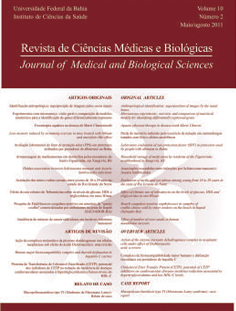Human major histocompatibility complex and thyroid dysfunction in hepatitis C carries
DOI:
https://doi.org/10.9771/cmbio.v10i2.4825Keywords:
Major histocompatibility complex. Hepatitis C. Interferon-alpha. Thyroid dysfunction. Autoimmunity.Abstract
The major histocompatibility complex (MHC) is a multigene family of receptors which are crucial in antigen presentation, mediation, and initiation of the cellular immune response. An association exists between certain MHC polymorphisms and autoimmune thyroid disease in animals and humans. Hepatitis C virus (HCV) infection has been shown to be associated with increased incidence of thyroid dysfunction, moreover, interferon-á (IFN-á) therapy of chronic HCV infection is associated with the thyroid dysfunction. IFN-á has been the basis for the treatment of HCV infection has been identified as an immunomodulatory cytokine that induces T-lymphocyte activation and expression of MHC molecules. Becomes evident therefore that the MHC- class I and MHC- class II antigens are central to the host immune response and thus are ideal candidate genes to investigate for associations with HCV infection. Autoimmune thyroid diseases are characterized by increased, rather than decreased expression, of MHC- class II antigen. Furthermore, work in animals suggests that the increased production of thyroid antibody and expression of MHC- class I and MHC- class II antigen are associated. This study will address the relation between MHC and thyroid dysfunction in HCV infection carries.Downloads
Download data is not yet available.
Downloads
Published
2011-12-07
How to Cite
de Oliveira Andrade, L. J., Santana de Melo, P. R., Santos França, L., Santos França, L., Andrade Malta, A. M., & Paraná, R. (2011). Human major histocompatibility complex and thyroid dysfunction in hepatitis C carries. Journal of Medical and Biological Sciences, 10(2), 179–186. https://doi.org/10.9771/cmbio.v10i2.4825
Issue
Section
Review Articles
License
The Journal of Medical and Biological Sciences reserves all copyrights of published works, including translations, allowing, however, their subsequent reproduction as transcription, with proper citation of source, through the Creative Commons license. The periodical has free and free access.


